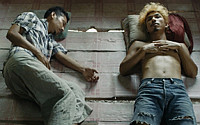| SHADOWS ON THE WALL | REVIEWS | NEWS | FESTIVAL | AWARDS | Q&A | ABOUT | TALKBACK | ||||
 Shadows off the beaten path Shadows off the beaten path | ||||
| Indies, foreigns, docs, revivals and shorts... | ||||
|
On this page:
MANTA RAY PEARL | RAFIKI | WE < < F O R E I G N > > last update 18.Nov.18 See also: SHADOWS FILM FESTIVAL | ||||
| R E V I E W B Y R I C H C L I N E | ||||
Manta Ray
| ||||
|
dir-scr Phuttiphong Aroonpheng prd Philippe Avril, Chatchai Chaiyon, Mai Meksawan, Jakrawal Nilthamrong with Wanlop Rungkamjad, Aphisit Hama, Rasmee Wayrana  release WP Sep.18 vff 18/Thailand 1h45 TORONTO FILM FEST 
|  Thai filmmaker Phuttiphong Aroonpheng puts an artfully personal spin on the Rohingya crisis, telling a story that has waves of meaning for refugees anywhere. It's a loosely plotted film, with very little dialog and no desire to tell the audience what to think. So it will be a challenge for unadventurous moviegoers who like everything spelled out for them. But those willing to dive into the film's currents will find that it has a lot to say.
Thai filmmaker Phuttiphong Aroonpheng puts an artfully personal spin on the Rohingya crisis, telling a story that has waves of meaning for refugees anywhere. It's a loosely plotted film, with very little dialog and no desire to tell the audience what to think. So it will be a challenge for unadventurous moviegoers who like everything spelled out for them. But those willing to dive into the film's currents will find that it has a lot to say.
In coastal Thailand, a fisherman (Rungkamjad) has a solitary life after his wife Saijai (Wayrana) leaves him for another man. When not working, he searches the forest for gemstones that attract manta rays, and one day discovers a man (Hama) wounded in the mud, he takes him home and nurses him back to health. This stranger is mute, and the fisherman calls him Thongchai, after a popstar. They develop a rhythm of life together until the fisherman fails to return home one day. So Thongchai takes over his job. Then Saijai comes back. Watching this sharp but uneducated fisherman show unconditional compassion to this stranger is simply beautiful, and it leads to a close bond that's powerfully moving. Even without being able to speak, they create a close friendship that gives both of them hope for the future. So the second half of the film, in which Thongchai has to make his own way, feels like a precarious challenge. And where the story goes from here has further ripples as far as the themes go, even though Aroonpheng never once pushes any point. The two actors create strikingly strong characters even though one of them never speaks. With his bleached hair and loose physicality, Rungkamjad plays the fisherman as a cool guy who has been beaten down by life. And the actor depicts his reawakening beautifully, finding a warm connection with Hama's thoughtful, observant stranger. By contrast, Wayrana's Saijai feels like the true interloper, manipulating the situation in ways the men never do. But she is just as vulnerable and needy. Writer-director Aroonpheng creates a stunningly elemental atmosphere, focussing on the earth, sea and trees, plus a colourfully playful use of light. When the fisherman transforms his hut into a vibrant disco, it's magical, a clever angle on the film's otherwise plaintive tone. In its quietly contemplative way, this is a yearning cry for compassion and understanding, playing on the power of human communication and connection even without the need for words. And the final scenes add some provocative touches that leave us with plenty to chew on. | |||
|
15 themes, language, violence 3.Nov.18 tiff
| | |||
| R E V I E W B Y R I C H C L I N E | ||||
Pearl

| ||||
|
dir Elsa Amiel scr Elsa Amiel, Laurent Lariviere prd Lionel Baier, Bruno Nahon, Caroline Nataf with Julia Fory, Peter Mullan, Vidal Arzoni, Arieh Worthalter, Agata Buzek  release Fr Oct.18 biff 18/France 1h22 
|  There's a great movie in here, although filmmaker Elsa Amiel resists committing to a perspective, which leaves the narrative feeling distracted by various subplots and side characters. A few intensely powerful scenes hint at a striking drama about a bodybuilder who reluctantly unbottles her maternal instincts. But some timid, awkward direction and an out-of-balance cast leaves the audience on the outside looking in. Even so, it's brittly moving.
There's a great movie in here, although filmmaker Elsa Amiel resists committing to a perspective, which leaves the narrative feeling distracted by various subplots and side characters. A few intensely powerful scenes hint at a striking drama about a bodybuilder who reluctantly unbottles her maternal instincts. But some timid, awkward direction and an out-of-balance cast leaves the audience on the outside looking in. Even so, it's brittly moving.
At a bodybuilding competition in Paris, Lea Pearl (Fory) is closely controlled by her trainer Al (Mullan), who seems to see her as the champ he could never become. Then Lea's scruffy ex Ben (Worthalter) appears at the hotel with their adorable 6-year-old son Joe (Arzoni), whom Lea hasn't seen for four years. Al is furious, while Lea tries to keep her distance, unsuccessfully. The question is whether all of this will put her off her game and jeopardise her competition. But as much as she tries, she can't simply reject her child. While Lea is central to the film, Amiel never quite decides whose story she's telling: Lea's, Al's or Joe's. Each angle is strong, but none of them are given quite enough depth to allow the audience to engage with them. Al takes a subtle, fairly obvious journey through the film, and should really have been a minor character. Scenes shot through Joe's eyes have a lovely sense of curiosity to them, adding a powerful soulfulness. But it's always Lea that we want to connect with: her journey is more provocative, thoughtful and intriguing. And she's a proper force of nature. Fory is terrific in the role, which requires her to plaster one expression on her face for publicity reasons while her feelings are seen only by the film camera. Her physicality is astonishing (and lovingly shot), but it's the way her features harden and soften emotionally that's gripping. Mullan is also excellent, as always investing his role with a steely internalised intensity that turns into physical rage when shaken. And Arzoni is a remarkably gifted child who shines in a number of pivotal scenes. The story of the rediscovered connection between Lea and Joe is so strong that every time the film cuts away from them it suffers. Meanwhile, Amiel also timidly shies away from anything gritty, including a badly botched physical brawl and a couple of vaguely insinuated sexual moments that by avoiding everything say nothing at all. But as a story of a lost woman reconnecting with herself and her child, this is surprisingly moving even if it's only sporadically involving. | |||
|
15 themes, language 9.Nov.18 tiff | ||||
| R E V I E W B Y R I C H C L I N E | ||||
Rafiki MUST
MUST  SEE SEE
| ||||
|
dir Wanuri Kahiu prd Steven Markovitz scr Wanuri Kahiu, Jenna Bass with Samantha Mugatsia, Sheila Munyiva, Nini Wacera, Jimmy Gathu, Neville Misati, Muthoni Gathecha, Patricia Amira, Dennis Musyoka, Mellen Aura, Charlie Karumi, Nice Githinji, Leila Weema  release Ken 23.Sep.18,
release Ken 23.Sep.18, UK Oct.18 lff, US Oct.18 ciff 18/Kenya 1h23 TORONTO FILM FEST LONDON FILM FEST 
|  Small and perfectly formed, this subtle but hugely involving romance takes on a powerfully taboo topic in its homeland of Kenya: same-sex romance. Without either preaching or pushing the premise too far, filmmaker Wanuri Kahiu follows two likeable young women who simply feel drawn to each other. Reactions from the people around them are surprising and darkly provocative, making this quiet little movie deeply important.
Small and perfectly formed, this subtle but hugely involving romance takes on a powerfully taboo topic in its homeland of Kenya: same-sex romance. Without either preaching or pushing the premise too far, filmmaker Wanuri Kahiu follows two likeable young women who simply feel drawn to each other. Reactions from the people around them are surprising and darkly provocative, making this quiet little movie deeply important.
The athletic young Kena (Mugatsia) lives with her strongly religious mother (Wacera) and helps her father John (Gathu) in his shop while supporting his run for a local political office. She hangs out with her womanising pal Blacksta (Misati) and plays football with the boys. But Kena has an eye for Ziki (Munyiva), the girly daughter of John's opponent Peter (Musyoka). And as Kena and Ziki begin to realise their attraction is mutual, they wonder if they dare to dream of a way to have a happy life together. Kahiu presents this story in a disarmingly natural way that can't help but engage audiences. The filmmaking is lively and alert, capturing the vibrant colours and sounds of the culture in Nairobi's suburbs, where the church is the centre of life and everyone knows everybody else's business. And as rumours begin to circulate about Kena and Ziki, the stakes quickly get very high, and the everyday homophobia becomes both a religious crises and a violent force to reckon with. Mugatsia is superb in the central role as a bright young woman who simply wants a good life. Smart enough to become a doctor but happy to train as a nurse, she loves playing sport with the guys, while knowing inside that she will only find love with a woman. Munyiva is a superb foil for her, and their performances nicely dovetail, making their chemistry vivid without the need for expressed sexuality. Watching them find happiness then facing seemingly insurmountable challenges is genuinely wrenching. This is a strikingly open-handed exploration of anti-LGBTQ laws. Without ranting at the system, Kahiu presents a very human story within the culture's religious context, challenging the viewer to see who's truly Christian. It's refreshing to find a Kenyan movie that openly and gently takes on a societal injustice without flinching. The film has been banned in its home country, and yet it was also chosen as the Oscar candidate, meaning it had to play for at least 10 days. Every screening was sold out, and it's still showing. | |||
|
12 themes, language, violence 6.Nov.18 tiff
| | |||
| R E V I E W B Y R I C H C L I N E | ||||
We
 Wij Wij
| ||||
|
dir-scr Rene Eller prd Rene Eller, Julius Ponten with Tijmen Govaerts, Maxime Jacobs, Pauline Casteleyn, Aime Claeys, Salome van Grunsven, Folkert Verdoorn, Laura Drosopoulos, Friso van der Werf, Tom Van Bauwel, Lieselot Siddiki, Gaia Sofia Cozijn, Axel Daeseleire  release Ned 12.Jul.18
release Ned 12.Jul.1818/Netherlands 1h39 
|  Almost deliberately transgressive, this Dutch-Belgian drama explores the extremes a group of teens are willing to go to simply to express their independence. Many of the plot's twists and turns are seriously outrageous, and yet the way the film is constructed adds a distance to everything, simply because the script contrives to keep the biggest shockers until the end. Even so, the confrontational style is powerful.
Almost deliberately transgressive, this Dutch-Belgian drama explores the extremes a group of teens are willing to go to simply to express their independence. Many of the plot's twists and turns are seriously outrageous, and yet the way the film is constructed adds a distance to everything, simply because the script contrives to keep the biggest shockers until the end. Even so, the confrontational style is powerful.
One boring summer, eight teenagers push each other to the limit. In their makeshift clubhouse, they make porn videos and try prostitution, then shift into blackmail when the mayor (Van Bauwel) pays a visit. Simon (Govaerts) and Femke (van Grunsven) are a loved-up couple until something happens to her. Ruth (Jacobs) keeps her crush on Simon secret. Liesl (Casteleyn) pushes herself further than expected. Thomas (Claeys) finds new confidence that scares everyone but him. Add pals Karl, Ena and Jens (Verdoorn, Drosopoulos and van der Werf), and their reign of terror lands them in court. The film opens with the trial, then recounts the story four times, as Simon, Ruth, Liesl and Thomas describe events to parents or lawyers. Each retelling adds more detail, eventually completing the plot threads, including the fate of both Femke and a stolen dog. There are also scenes with their parents, teachers and a lot of townspeople who get caught up in their wild activities. Their extortion plans don't go quite as expected. And they also have some wacky antics on their own, usually naked. The young actors dive full-on into these roles, which makes them feel strikingly realistic even if the group itself seems rather contrived. It's hard to imagine this combination of personalities together, but they do share the same invincibility, which is underscored by disaffection, boredom and insecurity. Their goal is to "find out who we are", and they revel in taking control over their bodies. So the games they play are often very funny, even if they're both rude and ultimately dangerous. Eller based the script on a true story, and as a director he keeps the youthfully exuberant tone remarkably authentic. But the four-strand structure leaves the film feeling somewhat awkward, revealing a series of increasingly boundary-pushing events until the conclusion, which is a succession of seriously vile revelations. The central theme here centres on a generation that rejects responsibility for its behaviour, childish stunts and wilful ignorance that cause real harm. And of course this attitude isn't limited to teens.
18 themes, language, violence, sexuality | 3.Nov.18 tiff 

See also: SHADOWS FILM FESTIVAL © 2018 by Rich Cline, Shadows
on the Wall
| ||